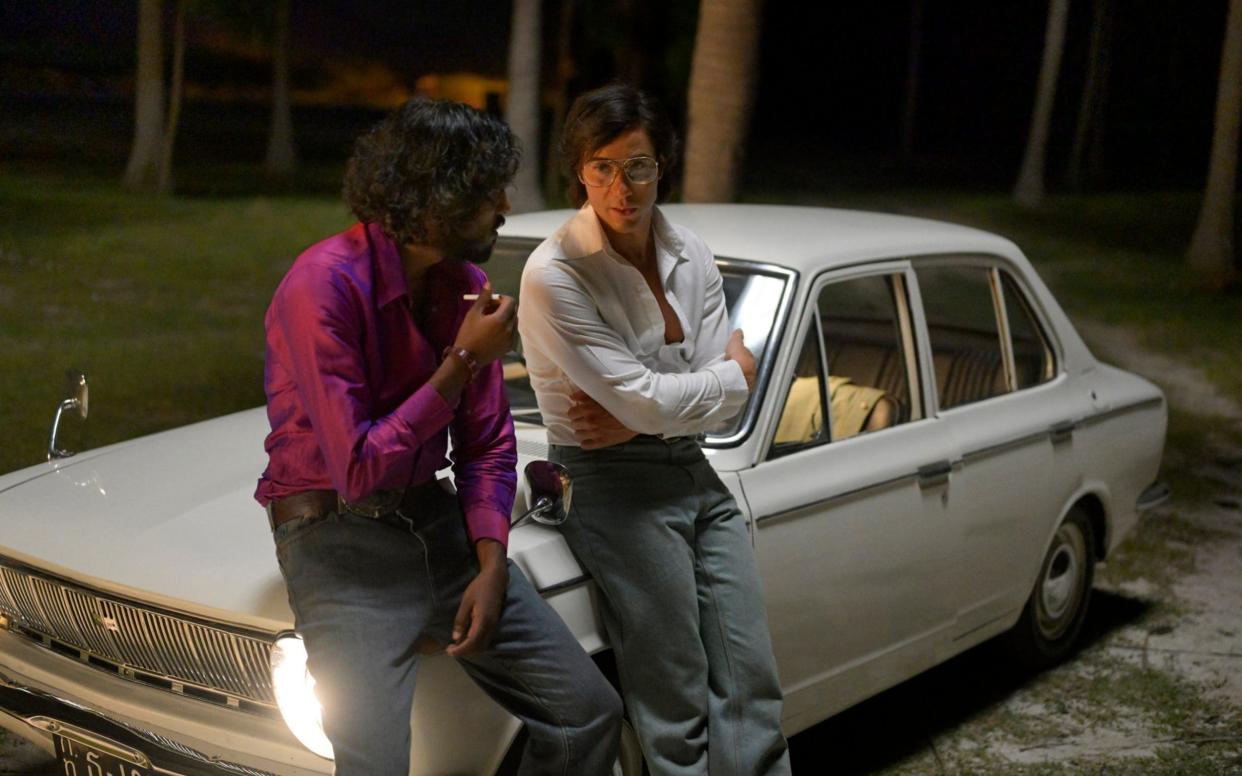The Serpent’s unsolved mystery: does Charles Sobhraj know what happened to Ajay Chowdhury?

In 1976, the serial killer Charles Sobhraj and his loyal lieutenant Ajay Chowdhury walked into the steaming Malaysian jungle together. Only Sobhraj walked out. Chowdhury was never seen nor heard from again. Had he just become one of the infamous monster’s last murder victims?
In the unsettling, stranger-than-fiction tale of French-Vietnamese psychopath Sobhraj - currently being documented by sinuously gripping BBC One drama The Serpent - his sidekick Ajay Chowdhury is arguably the most mysterious character of all.
Sobhraj himself (played on-screen by Tahar Rahim), now 76 and serving a life sentence in Nepal, might be coolly inscrutable but he’s been the subject of four books, three documentaries, a telemovie, a Bollywood film and now a hit eight-part TV series. This narcissistic self-publicist speaks to journalists when it suits him, especially if he can charge a hefty sum for the interview.
The man who eventually caught him, dogged Dutch diplomat Herman Knippenberg (portrayed by Billy Howle), is also still alive. He occasionally talks to reporters and collaborated with The Serpent’s production.
Yet Chowdhury, Sobhraj’s accomplice in at least eight murders and countless other crimes, remains an enigma. Is he alive or dead? Could he still be at-large somewhere, living under an alias borrowed from one of multiple stolen passports? And was he a villain or a victim?
Mumbai-born Chowdhury (played in The Serpent by newcomer Amesh Edireweera) first met Sobhraj in a New Delhi park in 1975. As a lifelong thief and fraudster, Sobhraj was a skilled reader of people. The chances are he sensed the young drifter’s vulnerability - his impoverished background, his loneliness, lust for the high life and desperation to be part of something. That something chimed with Sobhraj’s ambition to start a criminal “family" in the vein of Charles Manson's. It’s no coincidence that Sobhraj called impressionable acolytes like Ajay “my brother”.
The Serpent’s director, Tom Shankland, has spoken of the parallels between Sobhraj and Manson - two cult-like leaders who inveigled idealistic youngsters into their den.
“Individuals who have the desire and ability to spin yarns that draw people into their truth are fascinating,” says Shankland. “It’s why we go back to stories like Manson, who was committing crimes at about the same time as Sobhraj. There’s something poignant and disturbing about hippies’ innocent, hopeful vision of the world and what happens when that meets an uber-cynical, self-serving, f____ed-up character who preys on it.”
Shrewdly calculating beneath his beguiling charm, Sobhraj offered Chowdhury a job as his handyman and factotum, all the time burrowing into his psychology. They bonded over being non-white in a race-divided world. Chowdhury soon became inexorably enmeshed in the master manipulator’s web of drugs, deception and ultimately death.

Based at Kanit House apartment complex in Bangkok, opportunist Sobhraj was perfectly located to feed off the hippie trail across South-East Asia. He would dispatch the fiercely devoted Chowdhury - who was younger, more fashionably hirsute and could pass for “hip” - to seek out potential victims at the city’s backpacker hostels.
Here he would befriend Western “longhairs”, as they were dismissively known, and lead them back to his boss, usually on the premise of inviting them to a hedonistic pool party, before helping to poison them with drug-spiked drinks. Incapacitated or worse, they would be robbed of their travellers’ cheques and passports.
Chowdhury not only knew about Charles’ activities, he was increasingly complicit in them. As their time together went on and their crimes escalated, he went from obedient bag-carrier to Sobhraj’s right-hand man and partner-in-murder.
Nobody knows for certain why the pair progressed from petty theft to brutal violence. Some pundits have speculated that there was an unspecified trigger event. Others say the slayings might have started as a twisted, homoerotic death ritual triggered by drug psychosis (episode four of The Serpent depicts Ajay's volatile reaction to an acid trip).

One theory even goes that Chowdhury himself was the catalyst, since the killing spree made up a brief chapter in Sobhraj's long criminal career. After all, the killings started when Chowdhury entered the picture and stopped when he left it.
Either way, they committed their first confirmed murder in 1975. As seen in The Serpent’s opening episode, the victim was Teresa Knowlton (Alice Englert), a young woman from Seattle on her way to study Buddhism at a monastery. The duo drugged her and stole her belongings, before changing her into a swimsuit (hence Sobhraj’s sobriquet of “the Bikini Killer”) and drowning her in the Gulf of Thailand to make it look like a tragic accident.
Sobhraj went on to slaughter at least a dozen more backpackers across Southeast Asia, most of them with henchman Chowdhury’s assistance. The true death toll, according to experts, is likely double that. According to the Nepal police and Interpol, Chowdhury not only helped dispatch them - by stabbing, strangling, bludgeoning or forcible drowning in the bath - but was also suspected of burning victims’ bodies to prevent easy identification.
The seemingly erratic nature of the murders meant the authorities were slow to connect the deaths. When they killed a couple at the same time, Sobhraj would insist that he and Chowdhury took one life apiece, ensuring their mutual silence and equal culpability.
Sobhraj also kept Ajay loyal in a similar way to how he controlled fiancée Marie-Andrée Leclerc (played by Jenna Coleman) - with the trappings of a luxury lifestyle, by dangling the promise of a carefree life in Europe, by giving and withdrawing affection to keep them co-dependent, brainwashed and afraid. Like Leclerc said: “I have no passport, no money and if I try to leave, he will kill me.” In episode six, Ajay acknowledges how they are both in thrall to Sobhraj: “You play a role for him, just I like I do.”
As Leclerc sank further into denial to deal with her horror at how the group’s new-found “friends” kept disappearing, Chowdhury’s role became more crucial. He not only kept a close eye on Leclerc and physically intimidated her but he graduated to become Sobhraj’s confidant and co-conspirator. He soon accompanied him everywhere, much to Leclerc’s annoyance. As the besotted Ajay tells Charles in The Serpent: "Everything I’ve done for you, I’ve done it with a song in heart because we’re brothers."

The killers came close to being caught when they visited Nepal “on holiday” (an expedition also depicted in episode four) and committed the double murder of American backpacker Connie Jo Bronzich and her Canadian companion, Laurent Carrière. “After the discovery of the bodies, we traced Chowdhury to a hotel in Kathmandu,” says Bishwa Lal Shrestha, the police officer investigating the case in 1975. “But he gave us the slip.”
In The Serpent (spoilers ahead), Ajay’s compelling story comes to an end in episode six. Forced to choose between his disciples, Sobhraj decides to take Leclerc to Paris à deux, despite Ajay's attempts to convince him otherwise. The boss then drives his second-in-command to a remote location outside Karachi and callously leaves him stranded at the roadside of the road - but not before insulting his so-called “brother” and throwing money at him.
"This is all you’re good for," Sobhraj sneers cruelly. "Pocket change. Gutter work. You were never my partner, you were my errand boy. Now you’re nothing. A worthless little man. Marie was right - Paris is no place for a little brown thug." It's a cruel farewell and a reminder, if it were needed, of Sobhraj's sadism.
In real life, though, Chowdhury’s fate is much more opaque. It’s known that the gang travelled to Malaysia in 1976, all three using fake identities. Once there, Ajay was sent on an errand to procure gems from a mining town. When he returned to deliver the loot - several hundred carats of jewels, worth about $40,000 at the time (nearer $200,000 today) - he and Soubhraj went into that fateful forest together. Only one of them returned. Somehow an amicable parting appears unlikely.

Had Chowdhury outlived his usefulness and become one last loose end for Soubhraj to take tie up? Do his remains lie buried somewhere in the Malaysian bush? Whatever happened among the trees, Soubhraj and Leclerc flew to Geneva shortly afterwards, seemingly to sell the stolen stones to raise capital for further escapades.
Soubhraj has always denied killing him. Shrestha also discounts the murder theory. When the case file was reopened in Nepal in 2003 following Sobhraj’s arrest in Kathmandu, the police once again began a lookout for Chowdhury.
Discussing his role in The Serpent, actor Amesh Edireweera says: “The whole story is completely mental. And Ajay is particularly interesting because there are no direct accounts of him - just evidence from other people speaking about him. For me, the greatest shock was hearing his parents talk about him. I listened to an interview with Ajay's family, who described him as ‘such a good boy' and ‘so clever'. I heard Ajay's mother talk about 'her boy' and connected to the love that she still showed for him, in spite of everything that happened. I felt a real sense of sorrow for the family.”
Ajay Chowdhury was never arrested. Neither was a body ever found. The Interpol file on him remains open today and his whereabouts unknown. There was one unconfirmed sighting in Frankfurt in late 1976. Since then, nothing.
If he was alive today, Ajay would be in his early 70s, doubtless under an assumed name. While some close to the case presume he’s long dead, others theorise that he fled back to India or began a new life in Germany. It’s yet another elusive element in the endlessly slippery case of the Serpent.

